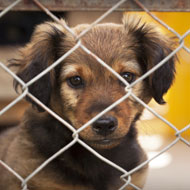
Illegal puppy trade 'remains a major concern'
The Scottish SPCA (SSPCA) has reported a 44 per cent rise in animals seized following cruelty investigations.
Figures published by the charity as part of its annual review show that a record 302 animals were taken into its care in 2017, around half of which were victims of the illegal puppy trade.
“Overall, 52 people were banned from owning animals last year following our investigations. That’s an average of one every week, with many of these animals having suffered in the most appalling conditions,” said chief executive Kirsteen Campbell.
“The illegal puppy trade remains a major concern, with 143 of the record 302 animals seized by our inspectors and undercover special investigations unit last year rescued from dealers who treat dogs as nothing more than commodities.”
She continued: “This situation simply cannot be allowed to continue, which is why we have welcomed the Scottish Government’s commitment to increase potential penalties for animal welfare offences, to tackle illegal puppy dealing and licence animal sanctuaries.”
The charity has called for court cases involving animals to be dealt with as swiftly as possible. This is because animal cruelty cases can often take years to be heard in court and many animals remain in the care of the SSPCA whilst their owners await trial.
“This is a real issue and the reason why we had more than 1,000 animals in our care in 2017 with no home to go to because their owners had not yet faced trial," Kirsteen continued. "First and foremost this not good for animal welfare, it is also entirely at our expense and we would like to see these types of cases being heard in court sooner."
Frontline SSPCA staff responded to a staggering 89,500 incidents in 2017 as a result of calls to the charity’s helpline.



 The latest
The latest